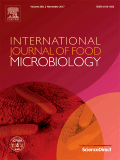Ver ítem
- xmlui.general.dspace_homeCentros Regionales y EEAsCentro Regional Mendoza - San JuanEEA MendozaArtículos científicosxmlui.ArtifactBrowser.ItemViewer.trail
- Inicio
- Centros Regionales y EEAs
- Centro Regional Mendoza - San Juan
- EEA Mendoza
- Artículos científicos
- Ver ítem
Effect of transient thermal shocks on alcoholic fermentation performance
Resumen
Stuck and sluggish fermentations are among the main problems in winemaking industry leading to important economic losses. Several factors have been described as causes of stuck and sluggish fermentations, being exposure to extreme temperatures barely studied. The objective of this study was to identify thermal conditions leading to stuck and sluggish fermentations, focusing on the impact of an abrupt and transient decrease/increase of temperature on
[ver mas...]
Stuck and sluggish fermentations are among the main problems in winemaking industry leading to important economic losses. Several factors have been described as causes of stuck and sluggish fermentations, being exposure to extreme temperatures barely studied. The objective of this study was to identify thermal conditions leading to stuck and sluggish fermentations, focusing on the impact of an abrupt and transient decrease/increase of temperature on fermentation performance and yeast viability/vitality. Different strains of Saccharomyces cerevisiae, SBB11, T73, and PDM were evaluated in synthetic grape must fermentations. Cold shocks (9 °C and 1.5 °C for 16 h) carried out on different days during the fermentation process were unable to alter fermentation performance. Conversely, shock temperatures higher than 32 °C, applied in early stages of the process, lead to sluggish fermentation showing a delay directly related to the temperature increase. Fermentation delay was associated with a decrease in cell vitality. The impact of the heat shock on fermentation performance was different depending on the strain evaluated and nitrogen supplementation (with or without diammonium phosphate addition). None of the conditions evaluated produced a stuck fermentation and importantly, in all cases must nutrition improved fermentation performance after a heat shock.
[Cerrar]

Autor
Vargas Trinidad, Andrea Susana;
Lerena, María Cecilia;
Alonso Del Real, Javier;
Esteve Zarzoso, Braulio;
Mercado, Laura Analia;
Mas, A.;
Querol, Amparo;
Combina, Mariana;
Fuente
International Journal of Food Microbiology 312 : 108362 (January 2020)
Fecha
2019-10
Editorial
Elsevier
ISSN
0168-1605
1879-3460
1879-3460
Formato
pdf
Tipo de documento
artículo
Palabras Claves
Derechos de acceso
Restringido
 Excepto donde se diga explicitamente, este item se publica bajo la siguiente descripción: Creative Commons Attribution-NonCommercial-ShareAlike 2.5 Unported (CC BY-NC-SA 2.5)
Excepto donde se diga explicitamente, este item se publica bajo la siguiente descripción: Creative Commons Attribution-NonCommercial-ShareAlike 2.5 Unported (CC BY-NC-SA 2.5)

